
Engagement in political process critical, Farm Bureau leader says
"If we don’t stay involved in the political process, we will fail," says American Farm Bureau Federation President Zippy Duvall. "We will miss the best opportunity we have to shape the future for our children and grandchildren. It’s our responsibility; it’s our time to make a difference."
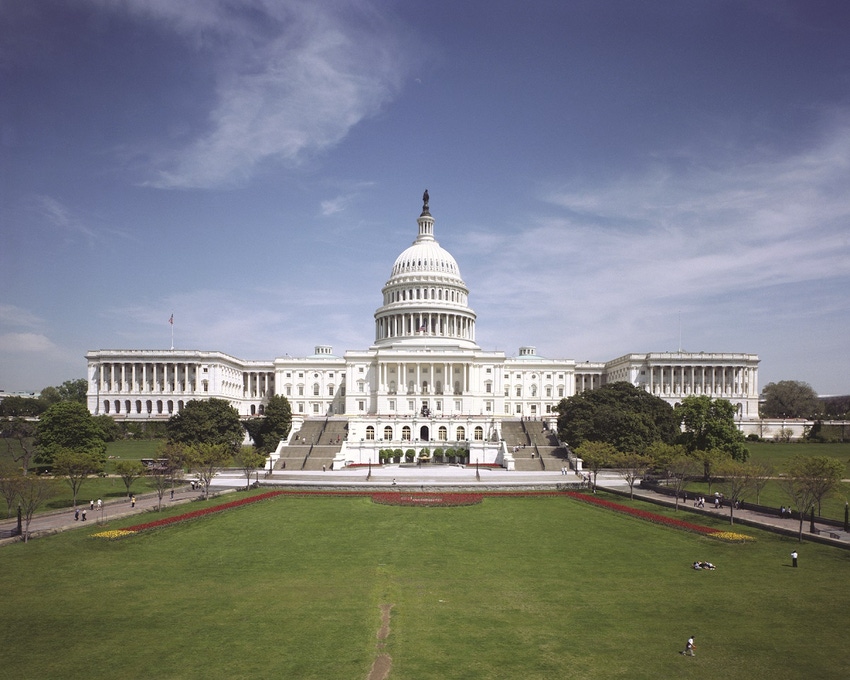
The leader of the nation’s largest farm organization says “we were extremely disappointed” at the severe cuts for farm programs in President Trump’s proposed federal budget, but he tempers that with the observation that the new secretary of agriculture had no input into the budget process.
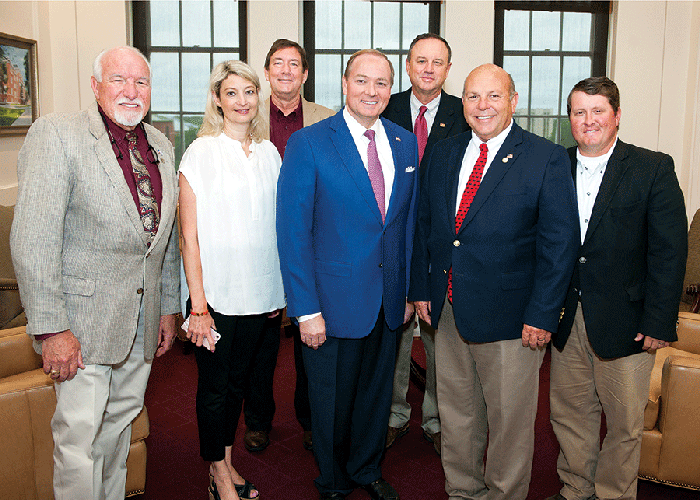
Mississippi State University President Mark E. Keenum, center, met with American Farm Bureau Federation President Zippy Duvall, second from right, during Duvall’s trip to Mississippi. He visited MSU for meetings with university leaders and tours of campus facilities. The meeting also included, left to right, MSU Associate Vice President for the Division of Agriculture, Forestry, and Veterinary Medicine Bill Herndon; AFBF Director of Executive Communications and Projects Lynne Finnerty; MSU Vice President for the Division of Agriculture, Forestry and Veterinary Medicine Gregory Bohach; Mississippi Farm Bureau Vice President for Central Mississippi Ted Kendall IV; and AFBF National Affairs Coordinator Justin Ferguson.—Photo by MSU Office of Public Affairs/Russ Houston
And says Zippy Duvall, the Georgia cattle/poultry farmer who heads the American Farm Bureau Federation and led a town hall session at the Mississippi Farm Bureau Federation’s annual commodity conference at Mississippi State University, while “we don’t agree” with the proposed budget, there’s many a hurdle and a lot of potential alterations as it makes its way through Congress.
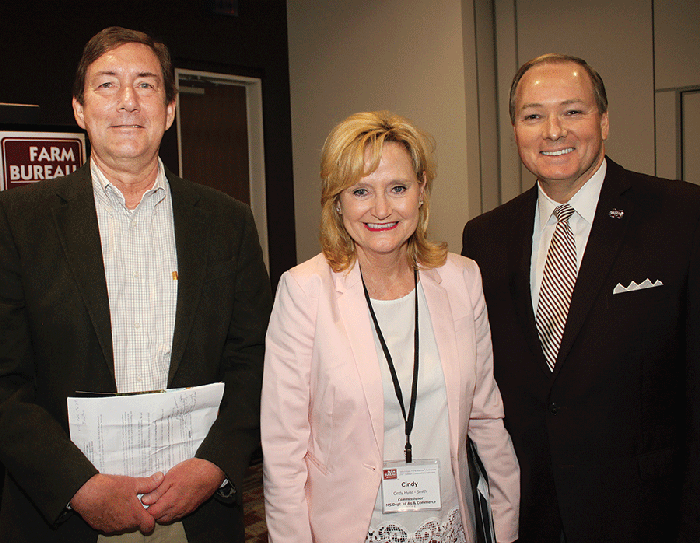
Mississippi Department of Agriculture and Commerce Commissioner Cyndi Hyde-Smith, center, visits with Dr. Greg Bohach, left, vice president of the Mississippi State University Division of Agriculture, Forestry, and Veterinary Medicine; and Dr. Mark Keenum, president, Mississippi State University.
“Secretary Sonny Perdue had been in office just a couple of weeks and had no input in that budget. The president always puts out a wish list, but it’s Congress that decides what will get funded and what won’t. After Secretary Perdue was sworn in, I went with him back to the USDA, where he addressed employees. He told them, ‘We’re going to provide quality service to rural America’s farmers and ranchers.’ He’s a good businessman, and I believe he’ll find a way to provide that quality service we all need.
To see all the photos from the Mississippi Farm Bureau Federation Summer Commodity Conference, click here: http://bit.ly/2tc0KZb
“I asked him about the farm bill and a safety net for farmers. He remembered, as a young man, having a soybean crop that was 8 inches tall and burnt to a frazzle, and getting down on his knees in the field and praying for rain. That’s the kind of man he is; that’s the kind of heart he has. He understands farm programs and how important a safety net is.”
MUST ESTABLISH PRIORITIES
But, Duvall says, “The Secretary can’t solve everything; — it’s going to take Congress working with him, and it’s going to take all of us in agriculture standing behind him in making tough decisions. We all understand deficits. We have to decide what are our most important priorities in the future for the few dollars available.”
Commodity groups and organization “need to prioritize what we think is important,” he says, noting that Farm Bureau has a good mechanism for that because its policy development begins with input from members at the grassroots level.
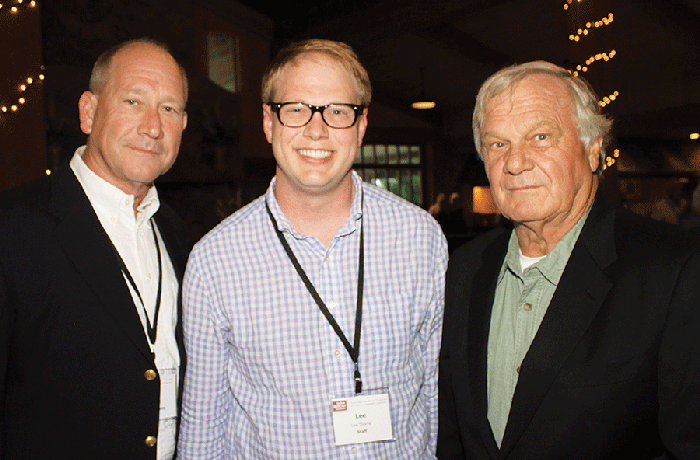
Paul Tedford, from left, Clarksdale, Miss., producer, and Lee Thorne, Mississippi Farm Bureau Federation staff, Jackson, Miss., chat with David Waide, former MFBF president, West Point, Miss.
The challenge for agriculture, Duvall says, is “to keep our commodity groups together, and not throw one or more under the bus. If cotton goes by itself, or dairy, or corn, and everybody’s trying to get a bigger piece of the pie than what they’ve had, we’ll all lose. Cotton farmers ought to help corn farmers, corn farmers ought to help cotton farmers, wheat farmers need to support dairy, etc.
“We’ve got to prioritize what we want USDA to deliver, get behind closed doors, make tough decisions, and then go to the Hill with one voice. If we go separately, the anti-farm groups will pick the meat off our bones. They’ve got a big bullseye on the cornerstone of the farm bill — crop insurance — and if they start messing with that, it will take the heart of the farm bill.
ENGAGEMENT IS CRITICAL
“We’ve got to be united. We’ve got to be engaged. We’ve got to show up at town meetings with members of Congress. And when a congressman shows us a stack of letters from anti-farm groups urging him to ‘cut this, cut that, don’t pass any farm programs,’ we’ve got to give him an even bigger stack of letters and e-mails so he’ll have something to stand on in supporting farm programs. Environmental groups and animal rights groups are doing it, and their pockets are deep. We in agriculture do a good job in the political process, but we’ve got to do better — we’ve got to make our non-farm friends and neighbors understand the importance of agriculture in their lives, or we’re all going to lose.”
In response to an audience comment that “the federal crop insurance subsidy is the only safety net farmers have left,” Duvall says, “I’m very optimistic we’ll be able to keep this subsidy, but the question is whether we can keep it at current levels. I’m not totally confident we can do that, but we’ve got to try.”
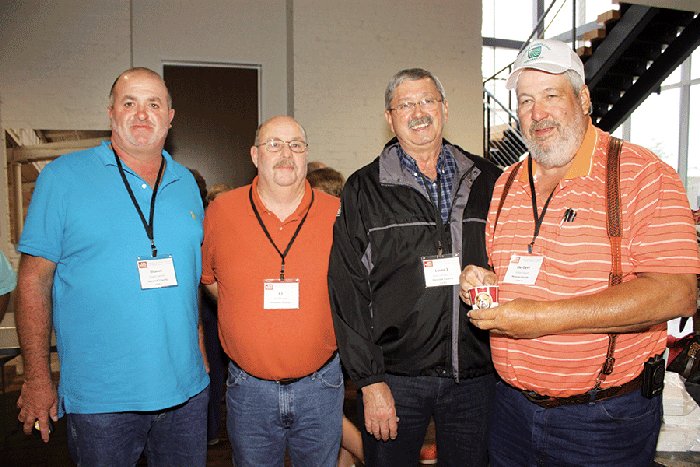
Kiln, Miss., representatives to the commodity conference were, from left, Shawn Ladner, E. J. Richards, and Louis Breaux IV, who chatted with Herbert Word, right, Okolona, Miss.
The crop insurance subsidy isn’t, as critics allege, a handout to farmers, he says. Rather, “it’s an investment in the food security that Americans take for granted every day. It’s an investment by taxpayers to make sure farmers will be able to plant the next crop. What the public doesn’t understand is that when you go to borrow a million and a half dollars for seed and fertilizer, it’s hard to get that loan without showing the banker you’ve got crop insurance. For most farmers, with costs as they are, if they can’t get loans they can’t plant crops.
ANTI-FARM ROADBLOCKS
“We’ve got to get this point across to a public that doesn’t understand agriculture. The anti-farm groups don’t want the government to spend any money on farm programs — these groups are a roadblock to the middle ground where solutions are found. If we’re so conservative that we can’t compromise and find solutions in the middle, we’re not going to get anything done.
“If Congress doesn’t get up and go to work, and if the anti-farm organizations or the Democrats can’t find some way to compromise, we’re not going to be able to solve any problems.”
In response to a question about the president’s promised programs to rebuild the nation’s infrastructure, Duvall says, roads, bridges, locks and dams are a vital component of commerce and agricultural trade. The ability to efficiently move farm commodities and other products “makes us the one country in the whole world that’s dependable, that can deliver its commodities and goods on time to other countries. No other country in the world is as dependable as we are, and we’ve got to invest in rebuilding our infrastructure.” That includes broadband, he says. “We’ve got to have broadband in rural areas to keep us competitive.
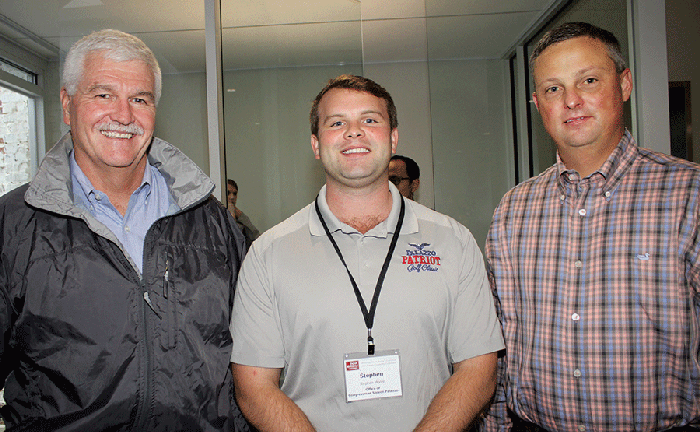
Stephen Moore, center, Hattiesburg, staff assistant for Mississippi Rep. Steven Palazzo, visits with Jim Watson, left, Board of Animal Health, Jackson, and Jon Kilgore, Mississippi Farm Bureau Federation staff, Jackson.
“We’re also really pushing for federal support of agricultural research and development, reinvesting in our Land Grant colleges that have been neglected for years and years. States have maintained these programs as best they can, but the federal government hasn’t kept up its part. Our achievements in R&D — new, better, more productive varieties, technologies, and more efficient and environmentally-friendly production methods have been a key ingredient making us a leader in world agriculture and trade. If the world needs it, we can deliver it, and we need to maintain this upper hand.”
PRESERVING FUNDS FOR AG
Responding to a question about the dairy program, Duvall says, “the dairy portion of the farm bill doesn’t work, and the crop insurance part of it didn’t work. Our economists have worked with other farm groups and the dairy industry to create a new product that we hope will be similar to crop insurance and will be useful to dairies of all sizes. We have more hoops to go through before rolling it out, but we hope to deliver it in 2018. It’s a bright spot for dairy, and we’re really excited about it.”
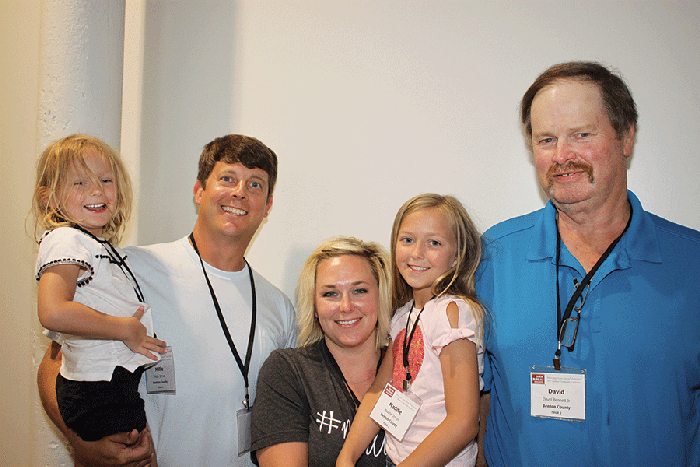
Benton County, Miss., producers attending the conference were, David Bennett, right, Ashland, Miss., and Matt and Carol Ormon, Hickory Flat, Miss., and their daughters, Millie, left, and Mady.
On the road to the new farm bill and to preserving money for agriculture in the federal budget, Duvall says, “Our emphasis has got to be on engagement. America’s farmers were engaged in last fall’s elections, and we helped change the direction of this country. But if we thought our job was finished when we voted, we’re badly mistaken — it only started then.” On the AFBF website, he says, “We have an engagement link where you can see what’s going on in Washington and where things stand with issues. And if there’s a call for action, write letters, make phone calls, send e-mails — be a part of the process. There’s no excuse not to respond to a call for action. If we don’t stay involved, we will fail. We will miss the best opportunity we have to shape the future for our children and grandchildren. It’s our responsibility; it’s our time to make a difference, and I really think Farm Bureau members will come through.”
That engagement, Duvall says, shouldn’t be limited to members of Congress from one’s own state. “Does it do any good for you to reach out to senators and congressman in other states for help on issues of importance to agriculture? Should you call a senator or representative in New Jersey or Minnesota whose support could make a difference in farm legislation?
By all means! Contacting legislators in other parts of the country can help to get things done.”
About the Author(s)
You May Also Like



